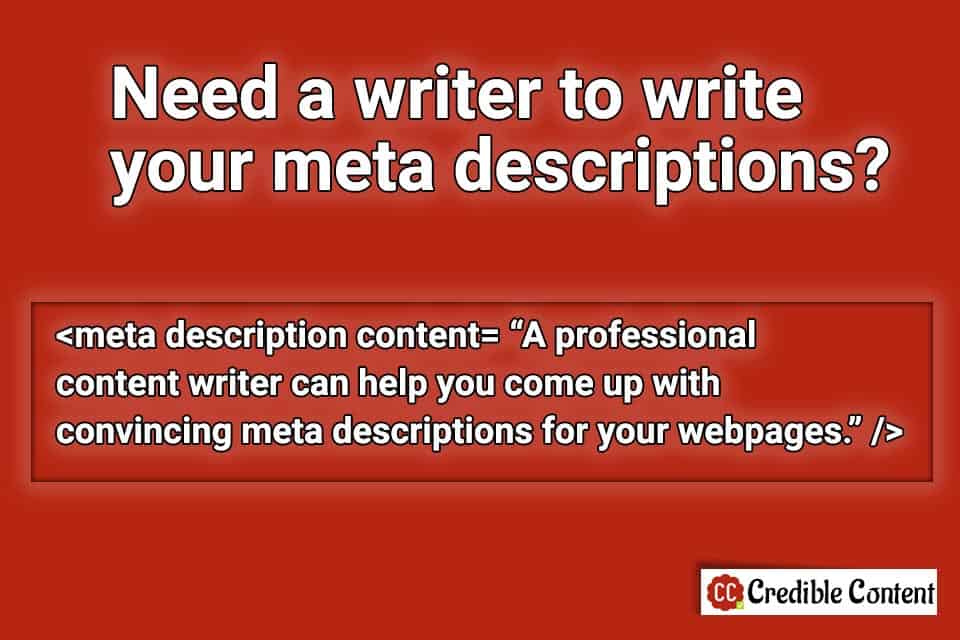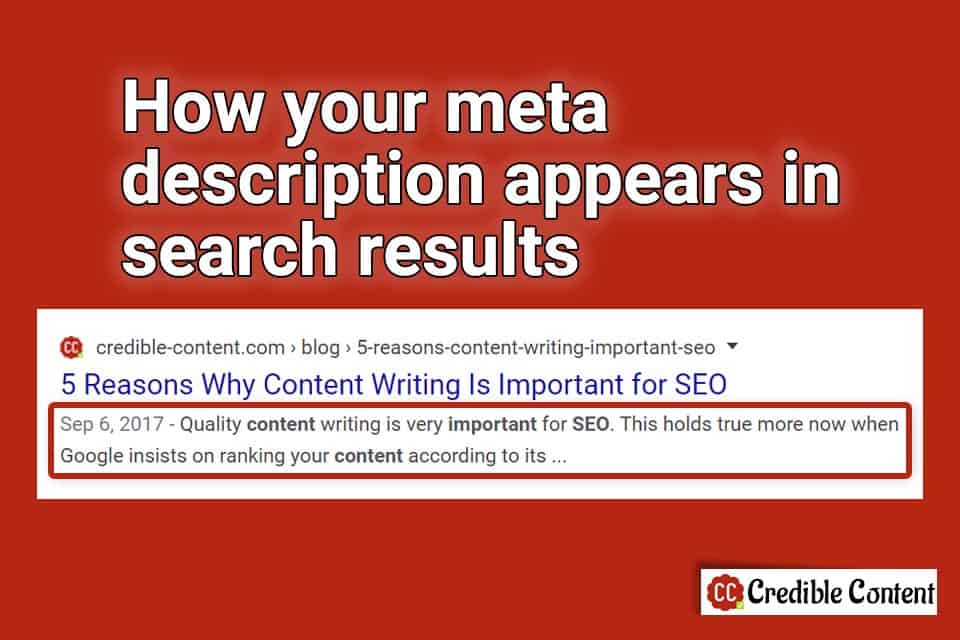
Although, as a content writer, I mostly write blog posts, web page text or copywriting materials such as landing pages and email marketing campaigns, many clients also want me to write meta descriptions for them.
Just today (September 14, 2020) spent a considerable amount of time writing 50 meta descriptions for the webpages of a client’s website.
Just meta descriptions.
I had the written main content for the website a few weeks ago and I had submitted all the documents.
A couple of days ago I received an email stating that they cannot come up with compelling meta description text.
What is meta description writing?
A meta description gives the summary of your web page or blog post to the search engines or social media websites (where your links are posted).
When you visit a web page or a blog post, you don’t see the meta description.
This description exists in HTML format, in the header area of your web page or blog post.
It is part of the source code – the HTML or the PHP program that displays the information on your website in a particular format.
Want to see the meta description of this web page?
Right click somewhere (preferably a blank area) and when the context menu appears, click on something like “View source code”.
Try to find something like
<meta name=”description” content=”” />
When you use Google, below the main hyperlink in the search results, this is the extra information that you read about a web page.
For example, in the screenshot below, I have highlighted the meta description information.

Meta description is very important.
This is why it is extracted from your web page and displayed in the search results.
Even when someone shares your link on Facebook, Twitter or LinkedIn, it is your meta description that is displayed.
It is a snapshot of your message.
Merely by reading your meta description your prospective visitor should be able to make out what information your web page contains.
Your title captivates your prospective visitor, and your meta description further the convinces him or her to visit your link.
Does your meta description affect your SEO?
The jury is still out.
Some SEO experts say that it has a direct impact on your SEO, and some say, Google doesn’t take the text in your description into consideration when ranking your content.
It is categorically said that Google doesn’t use the data in meta descriptions to decide your rankings.
Bing does.
Then why bother?
The reputed SEO company Moz very aptly describes here why your meta description is important:
The meta description tag serves the function of advertising copy. It draws readers to a website from the SERP, and thus is a very visible and important part of search marketing. Crafting a readable, compelling description using important keywords can improve the click-through rate for a given webpage. To maximize click-through rates on search engine result pages, it’s important to note that Google and other search engines bold keywords in the description when they match search queries.
The important expression you should pay attention to is, “The meta description tag serves the function of advertising copy.”
It is the information in this section that draws people to your website.
This may not directly affect your SEO, but if people don’t click your link for the keyword your content is being featured for, Google assumes that people are not interested in your link and hence, begins to lower its rankings for the keyword being used.
For example, if someone searches for “engineering spare parts for water pumps” and your link shows up and not many people click your link, your present rankings begin to suffer.
Hence, you can safely assume that your meta description has an impact on your SEO.
It doesn’t mean you stuff your description with the words because again, Google doesn’t use the text in your description to rank your web page or blog post.
It is the reaction of the people, the search engine users, that has an impact on your rankings and this reaction depends on how convincing your description is.
Your description helps in click-throughs and click-throughs affect your search engine rankings.
Getting clicks from Google are as important as getting featured or improving your SEO.
No matter how many impressions your content can generate, unless people click and come to your website, it doesn’t matter much.
And people click and come to your website when they are attracted by your web page title and your meta description.
Looking for a meta description writer?
Meta description is very short: merely 160-200 characters including spaces.
By SEO definition, your description shouldn’t be more than 160 characters, including spaces, because this is the number of characters that are displayed by Google, but you can have a lengthier description.
Having said that, some are claiming that since 2017 Google has been displaying 275 characters on the search engine results pages.
I’m not sure about 275 characters so for the time being, I’m going to safely stick with the 160 characters theory.
When you are having a lengthier description, make sure that the most important component of your meta description appears within the first 160 characters so that all the important information is visible in the search results.
Why do you need a content writer for writing meta descriptions?
As explained above, meta descriptions are very important.
Wherever information about your web page or blog post is extracted automatically, it is your title and meta description that are used to display your information.
When your link appears in search results, people read your description and then decide to come to your website.
When your link appears on people’s timelines on Facebook, Twitter and LinkedIn, people read your description and then decide to come to your website.
Consequently, your meta description must be written professionally, convincingly and accurately.
There shouldn’t be any grammar or spelling mistakes because if there are grammar or spelling mistakes in your description, people assume that even your website is going to have such mistakes and hence, cannot be relied upon.
Your brand image is represented by your meta description.
You can gauge the importance of meta description from the fact that Google uses it to display your link and even the social media websites use it to display your link.
Don’t they have technologies to just randomly pick up text?
They definitely do.
Exactly this is what happens when your link is featured in the “Featured Snippets” section of the search results.
Google automatically decides what text is most appropriate for the question being asked and then puts that text in the “Featured Snippets” section.
So, if it can randomly pick up text for the “Featured Snippets” section, why can’t it do the same for the description section?
Because it wants you to decide which information you want to provide to search engine users to attract them to your website.
Hence, if you want to put your best foot forward, you need a trained and experienced writer who can write you convincing meta descriptions.
Three things are very important:
- Your meta description must be enticing enough to make people click your link.
- It should be impeccably written because it is like the first impression that you make on your visitors.
- Maximum amount of useful information must be expressed within the first 160 characters, including spaces, so that even if Google truncates the remaining portion of your description, people get your important message.
I can help you with all these things.
Contact me if you’re looking for an experienced writer to write your meta descriptions.



